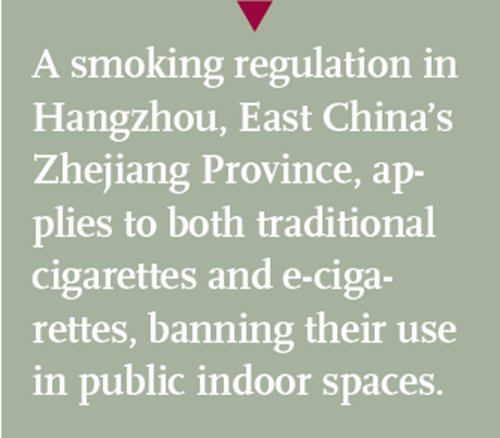- Home > News > Domestic News
- domestic news
Cities mull ban on e-cigarettes in public even though China is the biggest producer
○ E-cigarettes are growing in popularity in China, but there are no national regulations on their manufacture, sale and use
○ Chinese authorities are gradually waking up to the potential danger of e-cigarettes
○ Experts call for a ban on sales to minors and the smoking of e-cigarettes in public places
Chen Yang (pseudonym), 10, enjoys puffing on the new device that she bought in a shop near her school. It's an e-cigarette, and popular among her classmates.
Her mother was later astonished to find that e-cigarettes are common in shops near her school in Xianning, Hubei Province. Students buy the device thinking it's cool, and imitate adults smoking.
This case, reported by the Xianning Daily, is only one of many that show how e-cigarettes are increasingly popular among minors in China.
According to the World Health Organization, electronic cigarettes are devices that do not burn or use tobacco leaves but instead vaporize a solution the user then inhales. While they are healthier than cigarettes, the majority of e-cigarettes contain nicotine, which harms the central nervous system of teens, according to a report by the US surgeon general.
While consumption of e-cigarettes soars in China over the recent years, the country is lacking in regulations on their manufacture, sale and use, worrying anti-smoking experts and educators.
Booming industry
E-cigarettes are a booming industry in China. Although China only had a 6 percent share in the consumption of e-cigarettes in the world as of 2016, according to a report by Chinese consulting firm ASKCI Consulting, about 90 percent of e-cigarettes in the world are manufactured in China, mostly in Shenzhen. Most of these e-cigarettes are exported to countries in North America and Europe.
Its invention is also deeply connected with China. Chinese pharmacist Hon Lik reportedly invented the device in the early 2000s, hoping that it could help him quit smoking. But it soon gave rise to a multi-billion-dollar industry. He is now employed as a consultant by Fontem Ventures, a subsidiary of British multinational tobacco company Imperial Brands, which specializes in vaping technology.
Now, China's domestic consumption of e-cigarettes has also started booming. In 2016, China's e-cigarette market expanded by 316 percent. A report by TF Securities in October 2017 estimates that the domestic e-cigarette market will expand to 50 to 100 billion yuan ($7.2 to $14.4 billion), and is expected to give rise to numerous business opportunities.
On e-commerce platform taobao.com, a search for e-cigarettes will produce thousands of products, with some generating sales of tens of thousands each month. Many of the e-cigarettes promote themselves as non-toxic, healthy and a replacement for traditional tobacco.
Guo Tao, a Beijing-based e-commerce expert who tried e-cigarettes a few years ago, said consumers of e-cigarettes in China can be divided into two main categories.
"One is veteran smokers who hope e-cigarettes can help them quit smoking, as e-cigarettes are far less harmful than smoking," he told the Global Times.
But increasingly, young people, including high school and college students, have started to vape, joining what they think is a cool sub-culture. "A lot of people regard e-cigarettes as a way to show off their personality and how they're keeping up with the latest fashion. They probably have never smoked before, but e-cigarettes give them a taste of nicotine," he said.
A veteran smoker who tried e-cigarette recently told the Global Times, "E-cigarettes are much less potent than traditional cigarettes in terms of flavor. For me it's no replacement for tobacco. But it may be able to attract those new to smoking."

Experts worried
This new trend is getting experts worried. Wu Yiqun, deputy director of the Beijing-based think tank Research Center for Health Development, fears that e-cigarettes will damage young people's health and introduce them to smoking tobacco-based cigarettes.
On taobao.com, anyone can buy e-cigarettes without showing their ID or proving their age. There are even some e-cigarettes that are specifically marketed to students, some online reports show.
Wu said many of these e-cigarettes have false information about the amount of nicotine they contain. And it's difficult to know whether they contain any other ingredients that are harmful.
Some 6.9 percent of Chinese teenagers smoke, 19.9 per-cent of them have tried smoking at least once, and 180 million children in the country have been harmed by passive smoking, a Chinese health department official said in a event this May, according to chinanews.com.
Experiences abroad show that teenagers are extremely susceptible to smoking e-cigarettes. In the United States, e-cigarettes are soaring in popularity among youth. According to the 2017 National Youth Tobacco Survey, 11.7 percent of high-school students and 3.3 percent of middle school students used e-cigarettes in the last 30 days, compared with 1.5 percent of high-school and 0.6 percent of middle-school students in 2011.
E-cigarettes are also banned in over 20 countries and regions including Argentina, Thailand and Singapore. Hong Kong proposed a ban on e-cigarettes in October.
Chief Executive Carrie Lam said the health of citizens, particularly children and teenagers, was one of the main reasons why she considered such a ban, Xinhua reported.
Lack of regulations
Although China is the world's largest e-cigarette manufacturer, and despite the growing popularity in China, the manufacture, sale and use of e-cigarettes remain largely unregulated.
"E-cigarettes are regulated at most as an electronic device. It's not regulated as a tobacco product, pharmaceutical product or medical device," Guo told the Global Times.
But as China heightens its crackdown on smoking, the country's legislators are gradually waking up to the potential danger of e-cigarettes.
In April, Hangzhou, East China's Zhejiang Province, issued a new smoking regulation that applies to both traditional cigarettes and e-cigarettes, banning their use in public indoor spaces.
This month, Xi'an has started to implement a new smoking regulation that encourages operators of businesses, such as restaurants, to make their own regulations on e-cigarettes. Beijing's health authorities also said they will look into studies of e-cigarettes and their management and explore a ban on vaping in public areas.
On September 29, a passenger who vaped in the toilet on a flight from Hangzhou to Changchun was given five days administrative detention by airport police. According to the police, vaping on airplanes is banned in China, Xinhua News Agency reported.
As for sales, this August, Chinese authorities including the State Tobacco Monopoly Administration issued a notice banning the selling of e-cigarettes to minors, citing the lack of a national standard as one of the reasons.
However, this document isn't legally binding.
Experts say these regulations are not enough.
"The manufacturing, promotion, advertising, and sales of e-cigarettes should all be regulated. Use of e-cigarettes should be banned in public areas such as on public transportation, so that people don't have to suffer from second-hand vapor," Wu said.
According to recommendations of the World Health Organization, because exhaled vapor cannot be proven to be not harmful to bystanders, e-cigarette users should be legally banned indoors, especially where smoking is banned.
Considering that China's State Tobacco Monopoly Administration is for profit and has an interest in the vape industry, Wu thinks the best organization to regulate e-cigarette manufacturing and sales are China's food and drug authorities.

| Chinese Association on Tobacco Control Copyright © 1992-2011 906-907 Anhuidongli, Chaoyang District Beijing 100101 |